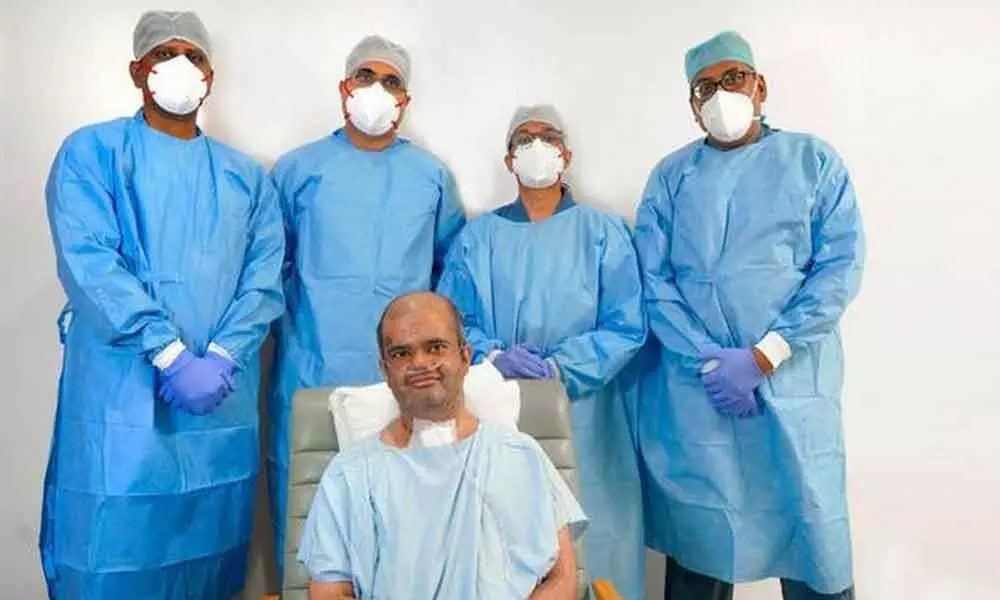Live
- STEM hiring to rise by 15-20 pc by 2027: Report
- UK Regulator Accuses Apple and Google of Stifling Mobile Browser Competition
- Tamil Nadu CM Stalin Invites Telangana CM Revanth Reddy for Meeting on Delimitation Impact
- Essential career tips for freshers
- Tips to avoid unnecessary mistakes while studying abroad
- Holi Festival: Liquor Outlets to Remain Closed for Holi in Hyderabad
- iQoo launches Neo 10R model
- Hyderabad: Woman Alleges Caste-Based Harassment by Roommates in Shaikpet
- Markets end on flat note
- Nifty Metal index falls after US tariffs
Karnataka's first-ever post-Covid double lung transplant conducted


Karnataka’s first-ever post-Covid double lung transplant conducted
Doctors at Aster CMI conducted the first post-Covid double lung transplant in Karnataka on a 30-year old Covid warrior and medical professional.
Bengaluru: Doctors at Aster CMI conducted the first post-Covid double lung transplant in Karnataka on a 30-year old Covid warrior and medical professional. The patient's lungs were damaged after contracting Covid-19 while treating patients. 30-year old anaesthetic, Dr Sanath Kumar from a private hospital in Bangalore was working alongside other doctors fighting the pandemic battle. He has treating critically ill patients suffering from Covid-19 and who had to be admitted into the ICU.
Reportedly, the medical professional was prone to suffer from sinusitis and had a fever during the period when all the frontline workers were being vaccinated. Due to this hitch, the patient was unable to take both his vaccines and became susceptible to the virus.
On finding himself displaying the symptoms of Covid-19, he underwent a Covid-19 test and the test returned positive. He was immediately put on medications but his condition continued to get worse. But his situation worsened when he experienced a sudden pain in the chest and developed resistant hypoxia. His oxygen levels dropped to 60 per cent and had to be put on a mechanical ventilator. At this point, he was referred to Aster CMI Hospital.
Doctors evaluated his condition and put him on ECMO support, He was kept under observation for three-four weeks but his lungs showed no signs of improvement. Doctors advised going for a double lung transplant.
A team of Critical-care Consultants, Pulmonologists, and Lung Transplant Surgeons at Aster CMI Hospital, Bangalore consisting of Dr Sandeep Attawar, Dr V Arun, Dr Srivatsa Lokeshwaran, Dr Sunil Kumar K and Dr Prakash Doraiswamy treated Dr Sanath Kumar for three and half months, performed double lung transplant and gave him a new lease of life.
The expert medical professional kept the patient stable for the next few weeks waiting for a suitable donor. After 4 weeks, they were able to secure a donor match and he underwent a lung transplant. "Increasingly, we are seeing patients with chronic lung disease who have no other option for survival and lung transplant has been a second life for a patient with chronic lung disease," said Dr Srivatsa Lokeshwaran, Consultant - Interventional Pulmonology, & Transplant Physician at Aster CMI Hospital.
"A double lung transplant is a gruelling surgery and is the only solution for patients who experience a life-threatening combination of lung damage caused by the covid-19 virus, an exaggerated immune response to it, and the body's failure to properly repair the injury. Eventually, in the self-repair phase, the deposition of yellow fibrotic scar tissue creates liver-like densification that makes the lungs completely solid.
This process of misdirected and inappropriate self-repair irreversibly destroys the tiny alveolar air sacs through which gas exchange happens. Patients only survive to the fibrotic stage if they are intubated and at times transitioned to ECMO support." said Dr Sandeep Attawar, Chair & Director of Thoracic organ transplants and Assist devices at KIMS Heart & Lung Transplant Institute. He added that often such complex surgery is required for patients who have been intubated, deconditioned, nutritionally inadequate and suffer from airway and bloodstream infections during their prolonged hospitalization.
Though the transplant was successful, doctors kept the patient on observation for post-transplant infections and rejections." It was very important to comprehensively address every challenge. Dr Sanath's condition was closely monitored for a few weeks before we mobilized him out of the bed." said Dr Sunil Kumar K, Lead and Sr Consultant - Interventional Pulmonology & Transplant Physician at Aster CMI Hospital. The patient was discharged after three-fourth months of prolonged treatment but he needs to stay indoors until his immune levels normalise.

© 2025 Hyderabad Media House Limited/The Hans India. All rights reserved. Powered by hocalwire.com






